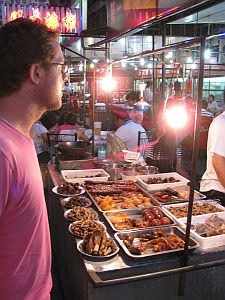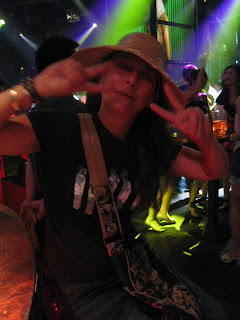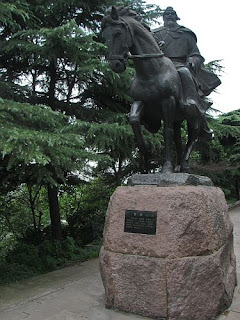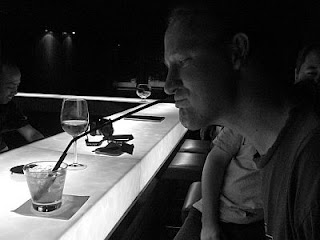Sun Quan (left) and Sun Ce
So let’s meet the Wus. Actually Wu is just the name of the kingdom that they form in the southern part of the Han empire. The real surname to watch is Sun (pronounced Soon, but quickly). Sun Ce (pronounced Tser) is the ruler of the area when the book starts, he hands it to Sun Quan (pronounced chew-an) who is the main man for most of the book. Sun Quan has some brilliant generals, some fantastic advisors and he himself is one smart cookie. His problem his he never makes up his mind whether he wants to defeat Cao Cao and prevent him from usurping the throne, or actively help him usurp the throne, or just sit down in the south and let the Wei and Shu Kingdoms fight it out then deal with the winner. He does all of these things and manages in the end to nobble the Shu kingdom utterly by killing Guan Yu and taking his lands, but just twenty years later the Wu kingdom (led by Sun Quan’s son) is a vassal under the Jin Dynasty. Sun Quan never seems to want the emperor position for himself and there’s quite a few times when you get the feeling he’s just getting by standing his ground; wishing he was spending more time relaxing.From the TV tower in Hanyang, that's Hankou on the left
and Wuchang on the right. Yangtze river on the right, Han river on the left.
You have to respect him for his efforts, he never loses his kingdom; but I end up hating him for screwing up Zhuge Liang’s plans. If Sun Quan hadn’t killed Guan Yu when he did, he never would have. The Wei kingdom would have fallen to Shu in another five or ten years and Zhuge Liang would have left a frickin amazing dynasty behind him. So that’s enough of politics from the novel, let’s check in on what’s there today. Wuchang is the capital of the Wu kingdom at the start of the book and today it forms the eastern side of Wuhan, a huge industrial city formed by combing three older towns; Hankou in the north, Wuchang in the east and Hanyang to the south. Nowadays the whole of Wuhan is a tremendous construction zone. The train stations are being extended to build a subway system, they’ve just finished connecting the fast train line from Nanjing, buildings are going up in every direction you care to look and it’s hard to find anywhere quiet. The three towns are separated by the intersection of the Han and Yangtze rivers, that meet almost at right angles in the centre of Wuhan. At that intersection there’s a place called Turtle Mountain. It’s called that because it’s higher than all the surrounding ground and apparently saved the locals from heavy flooding many times. They would all gather on the turtle’s back and wait until the water receded. This isn’t such a big problem nowadays with the Three Gorges Dam controlling the Yangtze river; but it is a cool park with a 280 metre television tower on top of it that you can visit for the view.Liu Bei, Guan Yu and Zhang Fei on Turtle Mountain
I was well happy to find statues of Three Kingdoms characters placed along the top of the walk along Turtle Mountain, but most surprised to find one of Cao Cao there. In the story he is an outright evil; a Machiavellian, paranoid, devious and self obsessed kinda guy. I couldn’t understand why anyone would build a statue of him; except as an object of disgust on whom you can spit. I did talk to a number of Chinese people about this question and imagine my surprise when I discovered that the communist government really like Cao Cao and are the ones responsible for his promotion. The angle they use is that he was a revolutionary leader, just like them, and he was doing everything to free the Chinese people from the oppression of a corrupt and decadent emperor. Well, he certainly did replace the emperor and Cao Cao was only a megalomaniacal psychopath, so maybe that’s a little better. Oh no hang on… there’s a whole section where Cao Cao disappears into the pleasure palace he builds for himself for half a year or so and does nothing but play with concubines. Nope, he was worse. I’m still amazed they wanted to promote him when they should have been pushing the righteous Liu Bei. In the end Cao Cao does become emperor, so I’m guessing they just want to be seen to be on the winning side.I stayed with a couchsurfing host, a French woman, who teaches way in the south of Hanyang at Jianghan university. I was only planning to stay a few days, but end up being there a week. This is partly because she’s so much fun and partly because it’s university holiday time and she manages to get me my own two bedroom apartment with airconditioning and internet access. It’s an apartment they provide for teachers working there. Best couchsurf ever! Ines has been working for four years now on putting the WOO! into Wuhan. I think it’s worked. She’s always up for a drink and a smoke, a walk and a dance, a talk with some music and definitely a laugh whenever possible. We go to an array of restaurants for Chinese, Uighur, Italian and French food at different times. She also hosts a Kiwi guy, Sam, at the same time, who sleeps on her couch and the three of us have a spectacularly excessive day and night together one Wednesday.
Ines and the Yellow Crane Tower
 It all started when she joins Sam and I for a visit to the Yellow Crane tower. The tower has been there a long time and been rebuilt a few times when it burns down. It has always been the symbol of Wuchang and now increasingly of Wuhan. The tower is an interesting place to visit and the view is fantastic, but superseded for me by the enormous bell hanging in a frame behind the tower. For ten yuan you can give it three good bashes with a log conveniently suspended next to it. With each ring the guy next to it yells something out in Chinese that I’m sure guarantees me good fortune, cold beers, eternal life and the polish women’s nymphomaniac netball team will use me as their mascot and sex toy.
It all started when she joins Sam and I for a visit to the Yellow Crane tower. The tower has been there a long time and been rebuilt a few times when it burns down. It has always been the symbol of Wuchang and now increasingly of Wuhan. The tower is an interesting place to visit and the view is fantastic, but superseded for me by the enormous bell hanging in a frame behind the tower. For ten yuan you can give it three good bashes with a log conveniently suspended next to it. With each ring the guy next to it yells something out in Chinese that I’m sure guarantees me good fortune, cold beers, eternal life and the polish women’s nymphomaniac netball team will use me as their mascot and sex toy.
We’re feeling hungry by the time we leave the Tower grounds and head for a huge restaurant street to find Drunken Shrimps. Ines tells me about it with a perverse delight, so I have to try it. When we choose a restaurant that can serve it and sit down at one of the huge tables on the street, we have an entertaining time choosing what else to order. None of us speaks or reads much Chinese and the place is very busy and noisy so we’re not sure what to do. Ines then walks around the tables with the waitress pointing at dishes and asking what meat is in them – the limit of her chinese. Doing this she orders up a storm – especially our Drunken Shrimps. To make this dish you take a bowl of watery soy vinegar soup, add a couple of handfuls of small live shrimps and some bean sprouts. Then pour in Baijiu (Chinese sake) and wait for the shrimps to stop thrashing around and die. Then eat them. Wasn’t bad at all. But the dumpling soup or insanely hot slices of chilli beef served cold were probably better.
Sam considering dinner options
This guy is tired of the insistent musos by now
While we’re eating all that with rice, musicians with an amazing array of instruments come to our table to try and get us to pay for a song or two. Some tables having parties love it and keep them for a while, but most say no; just like us. The quality of the performers is pretty average, but occasionally a real musician floats through and one or two tables in the restaurant pay them for a song. One group is determined to have us foreigners pay and we get auld langsyne and jingle bells played for us. This is despite asking them repeatedly not to. In the end I flip them 20 yuan for the sheer amusement value of having these guys playing traditional Chinese instruments as commercial whores for the foreigners. We stay in the restaurant for ages, enough time to finish off 17 half litre beers between us. This is when a fairly drunk Chinese guy lurches up to the table to welcome us to China and Wuhan. Apparently it’s is birthday and in true Chinese style he’s busy getting mashed. Well, he’s probably had one beer by now. His friends join us as you challenges anyone at the table to finish a whole bottle of beer in a race with him. We resist for a while, then I decide to go for it and we order two new cold beers.A crowd gathers around our table and people from the next restaurant stand up and lean in closer forming a couple of rows of spectators watching in awe as we start drinking. We bang down the bottles at the same time, but this is only because he saw me putting mine down and decided to finish to not lose too much face. I point out the centimetre of beer left in his bottle and he demands a new challenge as the crowd laughs and breaks up. Everyone wants to know where I’m from and I happily tell them in Chinese ‘I’m a crazy Australian’. One man gives me a big thumbs up and says,
“That’s very good.”
Before the guy can arrange beers for the new challenge, his last beer kicks in and his friends take him home red faced and burbling. We decide it’s time to hit a nightclub.
Chinese nightclubs have a standard format that never seems to vary around the country. The drinks are incredibly expensive, the beer is always warm and only available six bottles at a time. If you want spirits, you have to buy a whole bottle, which they will happily mix in a jug for you with ice and green tea. The music is mostly recent Chinese pop, with a smattering of American pop from anytime in the last forty years. The décor is the only thing slightly different, but it’s always one large room with blooths around the edges and tables in the middle. Dancefloors seem to be an optional accessory. The one thing I like about their style is that about once an hour live performers will jump onto a small platform and put on a show. It might be one or two dancers or a singer or even a group. They do three or four numbers in different places in the nightclub and give the atmosphere a huge lift everytime.
Hot Ines Action
Sam decides the drinks are too expensive and ducks outside to buy some baijiu from a small shop and sneak it into some coke. When he returns I’ve acquired some beers and glasses of coke that he then tops up with the Chinese sake. I have a small mouthful of the resulting mix and it takes a huge force of will over the next ten minutes to not throw up in the middle of the club. This stuff is vile. I know if I even stand up, I’m going to lose dinner and feel greatly relieved when the waves of pressure die down. Thankfully this passes and we get on with a night of increasingly silly dance challenges that culminate in Sam doing worm like manouevres leaning against the bar. He gets bounced and we follow into the night.On the way home we discuss the Chinese idea of losing face. This is a primal driver for most locals, gaining and losing face can make or break your life, marriage, career and friendships. Losing control of yourself is bad, having somebody obviously beat you in some social way is worse and having someone lower on the social hierarchy beat you is unthinkably bad. So we start to wonder if you can buy and sell face. How much does it cost to gain face? Is there a sliding scale based on your current and desired position? How do you bargain for this. Can you trade on the face market? If a poor guy with criminal history marries a rich girl from a good family does he gain face, or does she just lose face? Do they meet somewhere inbetween in the face stakes? Can her old man pop out to the local face market and prop up her failing stocks? If somebody finds out that you bought face, do you still gain face? Or lose even more? So if I know that you bought face can I blackmail you over revealing that? And if you make it public and then accuse me, do we both just lose face? Who loses more? We decide we need to form a lobby group to get the Chinese government to form a group to properly explore all these issues.
Dance like you've never danced before!
We finish the night having some beers on the roof of the building we’re staying in while listening to music on my portable music player. The sun appearing in the sky becomes our signal to sleep. I pass out quickly feeling very happy that reading a book has brought me here to have this experience.


















































